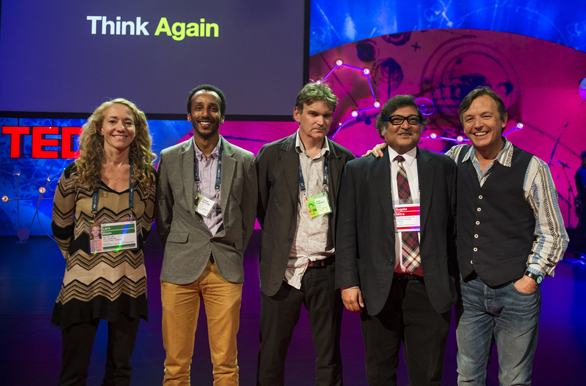By Courtney E. Martin
What do sperm donation, marathon runners, disabled rockstars, and yacht racing have in common? They’ve all been subjects of the careful eye and artistic vision of British director Jerry Rothwell, the winner of the first annual Sundance Institute | TED Prize Filmmaker Award, who has received $125,000 to spend the next 18 months documenting TED Prize winner Sugata Mitra as he builds a School in the Cloud.
Rothwell is a documentary filmmaker whose work includes the award-winning feature docs Donor Unknown, about a sperm donor and his many offspring; Heavy Load, about a group of people with learning disabilities who form a punk band; and Deep Water (co-directed with Louise Osmond), about Donald Crowhurst’s ill-fated voyage in the 1968 round-the-world yacht race. His latest film is Town of Runners, about young runners from Bekoji, an Ethiopian highland town that has produced some of the world’s greatest distance athletes.
Rothwell is a pioneer in participatory production, working with people to tell their own stories on film. He played a lead role in developing Hi8us Projects’ improvised dramas with young people for Channel 4, in establishing First Light, the UK Film Council’s scheme for young filmmakers, and in setting up digital storytelling exchanges among marginalized communities across Europe.
We caught up with Rothwell to ask a few questions about his vision for the project ahead.
What attracted you to the project?
From the beginning of my filmmaking career, I did a lot of work with communities and in schools with kids on making films about themselves. That kind of educational methodology has always really interested me. As I’ve moved into more traditional forms of filmmaking, I’ve tried to keep that participatory element in what I do. For that reason, I found Sugata’s TED talk very inspirational.
What was your own experience of education?
When Sugata talks about Britain’s “empire education,” that’s me. I didn’t get on badly in that system, but I am really aware — from my own work in schools — how the institutional structure of the school system fails some kids. My view is that the English education system, in particular, fails boys between the ages of about 8-13. It tries to work with them in a way that they are not very adapted to working.
It seems like there is a big trend in documentary films being intentionally tied to action campaigns (like Girls Rising, Waiting for Superman etc.). What are your thoughts about the role of films in this regard?
In general, my feeling is that films that directly campaign don’t make the best films. The best films are complex, nuanced, and engage the viewer in a thought process rather than hitting them with a message. At the same time, films are a powerful catalyst for action.
It’s a mistake to force the film to carry the message; instead you want to develop empathy in the viewer through a human story. If people are engaged in that process for an hour, or even 25 minutes, they will desire to do something, especially if it’s emotionally engaging. The task of making a film is about, first and foremost, making the film, but also to account for the power of filmmaking to galvanize people around a certain issue.

Filmmaker Jerry Rothwell (center) with (from left) TED Prize Director Lara Stein, producer Daniel Demissie, TED Prize winner Sugata Mitra and TED Curator Chris Anderson.
Will Sugata’s theories influence, not just the subject matter, but the actual making of the film in any way?
There is potential to make the film a counterpart of the methods that Sugata uses — take that notion that children may be able to self-organize and see if they can self-shoot and tell the story through the Schools in the Cloud.
Do you see any thematic threads from your past work to this project?
A lot of work that I’ve done in the past focuses on the subject matter in a unique way. Whether I’m looking at sperm donation or runners in Ethiopia, the common theme is about how you build empathy between audiences and people they may never encounter, how you get them to walk in the shoes of someone else for 90 minutes and come out with a totally different idea about what they knew.
What do you anticipate will be your biggest challenges?
I wonder, is a year enough time to show the real potential of the method and the project? It’s also hard to make films remotely. I’m going to try to work with Indian filmmakers and local kids. I also don’t want to make a film that’s promotional. I want to make a film that is true to the experience.
You’ve just met Sugata here at TEDGlobal. What is your first impression of him as a subject?
He’s all you’d hope for as a filmmaker. He’s funny. He’s very engaging. He’s humble, despite the enormous amount of attention that is thrust upon him, which would turn anyone’s head. He’s very grounded and able to keep things in perspective. Every talk we have gives a slightly different dimension and makes me realize a new possibility for the project.
How can the TED community, and those reading this, support you in this effort?
I would love help from the tech community here to think about how we embed ways of shooting in the communities. Any ideas they have about how to break the conventional ways of documentary using remote technologies would be great. We want to keep it personal and keep it owned by the kids.
Courtney E. Martin is the author multiple books, including Do It Anyway. She is also a member of the TED Prize team and co-lead of The City 2.0, the 2012 TED Prize focused on the future of cities.
Comments (3)
Pingback: What is the Future of Learning? | Dorset Eye
Pingback: The School in the Cloud, a documentary on Sugata Mitra’s TED Prize wish, premieres at CPH:Dox – World News